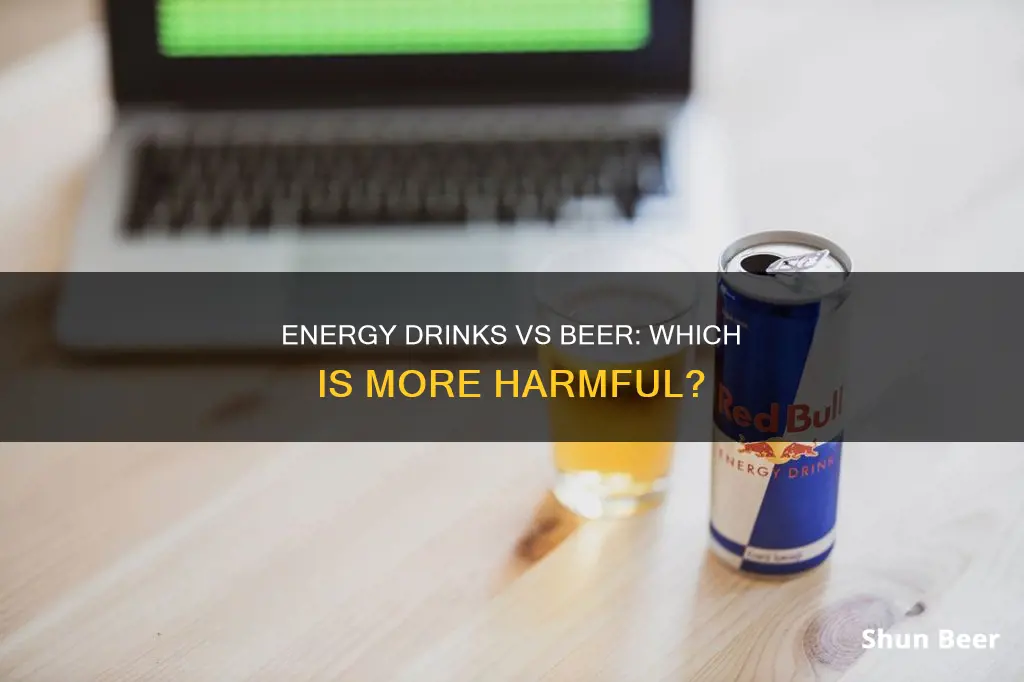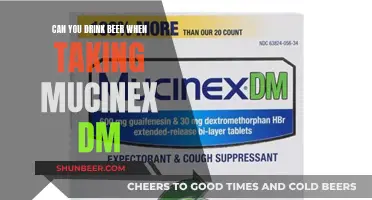
Energy drinks and beer are two popular beverages, often consumed for their stimulating and relaxing effects, respectively. While both drinks offer temporary benefits, they can also have negative consequences on health when consumed in excess. This comparison is an interesting one, as the two drinks have very different effects on the body, and the impact of long-term energy drink consumption is not yet fully understood.
What You'll Learn

Energy drinks have a high caffeine content
Energy drinks typically contain high levels of caffeine, with around 80 mg of caffeine per 8 ounces (237 ml). This means that it is easy to exceed the recommended adult caffeine consumption of no more than 400 mg per day if multiple energy drinks are consumed. Excessive caffeine consumption has been linked to heart problems, with studies finding that energy drink consumption can cause higher blood pressure and heart rate.
The high caffeine content of energy drinks can also lead to insomnia, nervousness, and jitteriness. Caffeine acts as a stimulant, and when mixed with alcohol, it can mask the depressant effects of the alcohol, leading to increased alertness and the potential for more alcohol consumption than intended. This combination of alcohol and caffeine has been found to increase the probability of alcohol-attributable harm.
In addition to the immediate side effects, the long-term health effects of regularly consuming high amounts of caffeine are not yet fully understood. While coffee and caffeine are not new substances, energy drinks often contain far higher levels of caffeine than a typical cup of coffee. As a result, the potential impact of regularly consuming these high-caffeine beverages over an extended period is still being studied.
The high caffeine content in energy drinks can also lead to addiction. Regular consumers of energy drinks may experience negative side effects when they go without their usual caffeine intake, such as feeling terrible and low energy. This can create a cycle of dependence on these drinks to maintain energy levels and avoid withdrawal symptoms.
Overall, the high caffeine content of energy drinks has been linked to various negative health effects, and it is important to be aware of the potential risks associated with their consumption.
Brown Bag Beer: Is Drinking in Public Legal?
You may want to see also

Beer has health benefits in moderation
Energy drinks are loaded with sugar and caffeine, as well as other artificial additives, which can be extremely difficult for the body to process. Drinking them daily is bad for your heart, and the high caffeine content can lead to addiction. On the other hand, beer has been consumed for thousands of years and can be part of a healthy lifestyle when consumed in moderation.
Drinking one or two standard beers per day (12 ounces or 355 ml) may have positive health benefits. Firstly, beer contains some minerals and vitamins, including B vitamins and small amounts of potassium, calcium, thiamine, iron, and zinc. These vitamins and minerals are a result of the beer-making process, which involves cereal grains and yeast.
Secondly, light to moderate beer intake has been linked to improved heart health. Several studies suggest that one drink per day for women and two drinks per day for men can lower the risk of heart disease, similar to the effects of wine.
Thirdly, beer may help with blood sugar control. Light to moderate alcohol intake can improve insulin resistance and reduce the risk of developing type 2 diabetes. A large study found that moderate alcohol intake was associated with a significantly lower risk of diabetes for both men and women.
Finally, beer may also have benefits for bone density and dementia risk. Low to moderate beer intake has been linked to stronger bones in men and postmenopausal women, and it may also reduce the risk of dementia.
However, it is crucial to emphasize that excessive beer consumption or binge drinking negates these potential health benefits and can lead to serious health issues, including an increased risk of early death, alcohol dependence, depression, liver disease, weight gain, and cancers. Therefore, it is essential to consume beer in moderation and ensure a balanced and healthy lifestyle.
Recovering Alcoholics and Ginger Beer: Is It Safe?
You may want to see also

Energy drinks can cause insomnia
Energy drinks are marketed as a way to boost physical and mental performance, but they can have a detrimental effect on sleep. Caffeine is the main active ingredient in energy drinks, and it is well known for its ability to disrupt sleep. Energy drinks can cause insomnia by increasing alertness and stimulating the nervous system. This can lead to a dangerous cycle where people become reliant on energy drinks to get through the day, only to find that they are unable to sleep at night.
Research has found a strong link between energy drink consumption and insomnia, especially among young adults. A study published in BMJ Open found that daily energy drink consumers took longer to fall asleep and slept for about 30 minutes less than non-drinkers. They also experienced more sleep disturbances, such as waking up during the night. Even occasional energy drink consumption—as little as one to three times a month—was associated with more sleep issues.
The high caffeine content of energy drinks is the main culprit for sleep disturbances. A single can of an energy drink can contain 200 to 300 milligrams of caffeine, which is more than double the amount in a cup of coffee. Some energy drinks may have even more caffeine than their labels suggest, as they include other caffeine-containing ingredients like guarana. This high caffeine intake can affect both sleep initiation and maintenance, making it difficult for people to fall asleep and stay asleep throughout the night.
The effects of energy drinks on sleep can vary depending on individual factors such as weight, sex, age, and metabolism. However, it is important to recognize that side effects such as heart palpitations, elevated blood pressure, and agitation can occur at different caffeine intake levels. Therefore, it is crucial to pay attention to how your body reacts to caffeine and be mindful of your personal limitations.
In addition to disrupting sleep, energy drinks can also have other negative health consequences. The high sugar content of energy drinks contributes to obesity and cardiometabolic disease risk. When mixed with alcohol, energy drinks can increase the risk of heavy drinking and impair judgment, leading to risky behaviors. The stimulant effects of caffeine can also mask the effects of alcohol, leading to overconsumption. Therefore, it is essential to consume energy drinks in moderation and avoid mixing them with alcohol.
Beer and Lisinopril: Is It Safe to Drink?
You may want to see also

Alcohol can cause liver issues
Energy drinks and beer are both consumables that have been associated with negative health effects when consumed in excess. While one source suggests that moderate daily alcohol use may be linked to improved health, excessive drinking can lead to negative health consequences. Similarly, energy drinks have been criticized for their high sugar and caffeine content, which can be difficult for the body to process and may lead to heart-related issues and addiction.
Now, focusing on the topic of alcohol and liver issues:
Alcohol-related liver disease (ARLD) is a condition caused by excess alcohol intake, which can lead to severe liver damage and even liver failure. The liver is a resilient organ that plays a crucial role in filtering toxins, aiding digestion, regulating blood sugar and cholesterol, and fighting infections. However, heavy alcohol consumption can overwhelm the liver, causing cell death and reducing its ability to regenerate over time. This can result in permanent liver damage and serious health complications.
ARLD typically progresses through three main stages:
- Alcoholic Fatty Liver Disease: Even a few days of excessive drinking can lead to a build-up of fat in the liver, causing it to enlarge. This stage rarely causes symptoms but serves as a warning sign of harmful alcohol consumption. The good news is that this stage is reversible; abstaining from alcohol for a period of time, usually a few weeks to months or years, allows the liver to recover.
- Alcoholic Hepatitis: Prolonged alcohol misuse over a longer period can lead to inflammation of the liver, known as alcoholic hepatitis. This stage can be life-threatening, and many people only become aware of their liver damage when it reaches this point. While mild cases are reversible with permanent abstinence from alcohol, severe alcoholic hepatitis can be fatal.
- Cirrhosis: At this advanced stage, the liver becomes significantly scarred, and its function is impaired. Cirrhosis often presents no obvious symptoms, but it is generally irreversible. However, stopping alcohol consumption immediately can prevent further damage and increase life expectancy.
The treatment for ARLD primarily involves abstaining from alcohol, which is crucial for preventing further liver damage and improving the chances of recovery. In severe cases, a liver transplant may be required if the liver has stopped functioning and does not improve with abstinence.
It is important to note that ARLD often goes undiagnosed until it reaches an advanced stage or is detected during tests for other conditions. Therefore, it is essential to be aware of the signs and symptoms of ARLD, which include jaundice (yellowing of the skin and eyes), swelling in the ankles and abdomen, confusion, drowsiness, and vomiting blood or passing blood in stools.
In summary, alcohol can indeed cause liver issues, and ARLD is a serious condition that can have life-threatening consequences. The best way to prevent ARLD is to avoid excessive alcohol consumption and stick to recommended drinking guidelines. If you have concerns about your alcohol consumption or liver health, it is important to seek advice from a healthcare professional.
Drinking Beer in Public: France's Laws Explained
You may want to see also

Mixing energy drinks with beer is dangerous
Energy drinks and beer are both beverages with very different purposes. Beer is a popular alcoholic drink made from yeast-fermented malt, while energy drinks are marketed as a product to boost one's energy. Both drinks have their benefits and drawbacks, but excessive consumption of either can be harmful.
Additionally, mixing energy drinks with beer can disrupt sleep patterns and cause nervousness and jitteriness. The high caffeine content in energy drinks, when combined with alcohol, can make it difficult for individuals to fall asleep or achieve restful sleep. This disruption in sleep can further contribute to health issues and impair judgment and reflexes.
The combination of energy drinks and beer has also been linked to heart problems. Energy drinks themselves have been associated with higher blood pressure and heart rate, and when mixed with alcohol, these effects can be exacerbated. A study of young Australian adults found that individuals who consumed a mix of alcohol and energy drinks were six times more likely to experience heart palpitations than those who drank only alcohol. This indicates a significant increase in cardiovascular risk when mixing the two beverages.
Furthermore, the high sugar content in energy drinks can also be detrimental when mixed with beer. The sugar, coupled with the alcohol, can lead to a higher risk of weight gain and obesity. While beer itself has been associated with heart disease and liver disease when consumed in excess, the addition of energy drinks can further compound these health issues.
In conclusion, while both energy drinks and beer have their own sets of benefits and drawbacks, mixing the two can lead to dangerous health consequences. The masking of alcohol's effects, disruption of sleep, increased heart-related issues, and potential weight gain are all serious concerns when combining energy drinks and beer. It is important to consume both beverages in moderation and avoid mixing them to mitigate potential health risks.
Bottle-Fermented Beer: Does Age Matter?
You may want to see also
Frequently asked questions
Both drinks can be harmful if overconsumed. Energy drinks can cause heart problems, nervousness, insomnia, dehydration, and heart complications. Beer, when drunk in excessive amounts, can lead to liver disease, high blood pressure, and alcohol dependency. Beer is also associated with negative health consequences when drunk in excess, but moderate daily alcohol use is associated with improved health.
Energy drinks contain carbonated water, sugar, artificial sweeteners, and caffeine. Beer is made from yeast-fermented malt and is flavoured with hops.
Mixing energy drinks and beer can be dangerous. Energy drinks are meant to stimulate the drinker, while alcohol acts as a sedative. When mixed, the caffeine in the energy drink masks the depressant effect of alcohol, causing the drinker to remain more alert and tempting them to drink more than they normally would. This can lead to a higher probability of alcohol-attributable harm.







